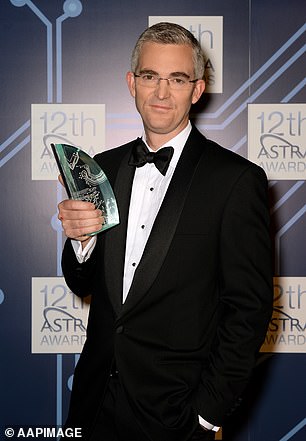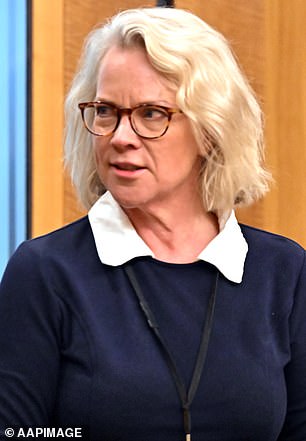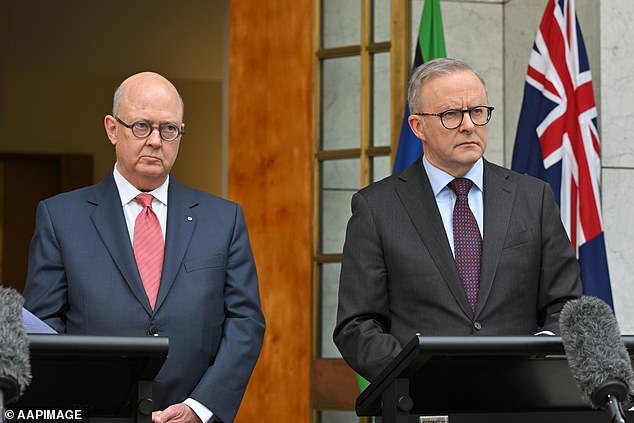Out with the old and in with the new. Just a year into a new five-year contract, ABC chief executive David Anderson has “resigned,” ending his six-year tenure in the role.
The change at the top bears the imprint of the new president, Kim Williams, everywhere.
There has been much talk and speculation about Williams’ intentions to “fix” ABC — that is, eliminate the activism that has dominated much of its high-profile journalism and rein in some of the network’s biggest names.
The new president made his intentions clear just weeks after taking office: “If you don’t want to reflect a vision that aspires to impartiality, don’t work at ABC.”
I wish him luck, but I don’t give Williams any chance of success.
The deep-rooted leftist bias at the public broadcaster is evident. It is evident in polls, in surveys of its staff and when examining the public statements of its most prominent journalists.
Which is not to say that ABC doesn’t do a good job. Of course it does. And of course there are plenty of journalists within the organization who keep their ideological opinions to themselves.
With more than a billion dollars in public funding and no commercial pressures to speak of, the ABC occupies a vital place in the fourth estate. And its regional reporting shows hardly any political or ideological bias.
Peter van Onselen, political editor of the Daily Mail Australia, does not give ABC chair Kim Williams (left) any chance of success in removing the left-wing bias from the public broadcaster. Above, Williams with Prime Minister Anthony Albanese.
But when it comes to its most prominent presenters and journalists, bias doesn’t even lurk in the shadows: it’s posted on Twitter regularly, despite social media rules that are supposed to prevent it.
Deep-rooted cultural bias affects the way the organisation covers all kinds of national and international news. And the ideological shift from treating allegations as facts and running activist campaigns while pretending to report objectively is a problem in itself at the ABC.
Again, because the organization is well-resourced, its reports and research are still informative, but the bias is hiding in plain sight.
Whether or not you agree with this view, Williams certainly agrees with it, has said so explicitly, and now plans to change it. So why will it fail?
Because as chairman of the board he can’t do much more. He can appoint the new CEO and that’s it.
Unless Williams has in mind some mythical superhero who can accomplish what no human before him has ever achieved, once appointed, the new CEO will be captured by the company culture like those who preceded him.
This is a bottom-up organisation that cannot be quickly changed from the top. The staff rejects the intervention of the general manager. New appointments are made by line managers, not by the boss. Scheduling decisions are not dictated by the general manager either.
Even if Williams were to become ABC’s chief executive — capable of running the organization (in theory) and managing the board — he would fail to make a dent in the existing culture. That would happen even if Williams lasted two full five-year terms, which he probably won’t.
If the Albanese government is re-elected, how willing do you think it will be to support Williams’s intentions to eliminate the entrenched bias at the public broadcaster that favours Labor over the Coalition?


David Speers’ (left) blunt journalistic style has led to bizarre accusations of bias in X. On the right is political correspondent Laura Tingle.
The task of changing the culture at a place like ABC is beyond the scope of a single president, a single CEO, and probably multiple presidents and CEOs all pulling in the same direction, which they never do. That is precisely why entrenched culture outlives those who come and go trying to change it.
Anderson thought he could make a difference, but in the end he became a weak leader with little authority. The staff collective took over.
At a company like ABC, the CEO doesn’t run the organization, the organization runs the CEO. The president simply shows up every month for board meetings.
I have worked and appeared on a number of ABC programmes over many years. They are generally well-run and informative programmes.
But they all lean in the same direction, to varying degrees.
It’s easy to identify a litany of high-profile ABC talent who lean one way, but it’s nearly impossible to find more than the occasional fish out of water who leans the other way.
The fact that some of the crazies on social media think Insiders presenter David Speers is a right-winger only highlights the lack of right-wing talent that exists at the public broadcaster, to counter all the ideological leftists.
One of the many reasons the ABC leans left is because staff feel they need to do so in order to balance the bias they see evident in places like News Corp.
Whether or not they are right in that assessment, it is not the job of a public broadcaster to try to restore “balance” by leaning left to counter whatever anyone in the commercial media is doing.
Commercial media can do what they like, they are all private organisations. The role of the ABC is to be balanced within itself. Williams knows this and wants to enforce it, but he will fail as all those who preceded him and had the same aim failed.
That said, Williams is probably the most formidable president we’ve seen in a long time and he made his intentions clear from the start.
But he was unable to force through the changes he wanted to make at News Corp as chief executive before he was fired, and he certainly won’t force through the changes he wants at the ABC now. Certainly not without having an executive role.
But just as it’s fascinating to watch nature documentaries when a pack of hyenas take down a buffalo, it will be essential viewing in the years to come as the ABC collective slowly but surely takes down Williams and his grand plans.
(tags to translate)dailymail

